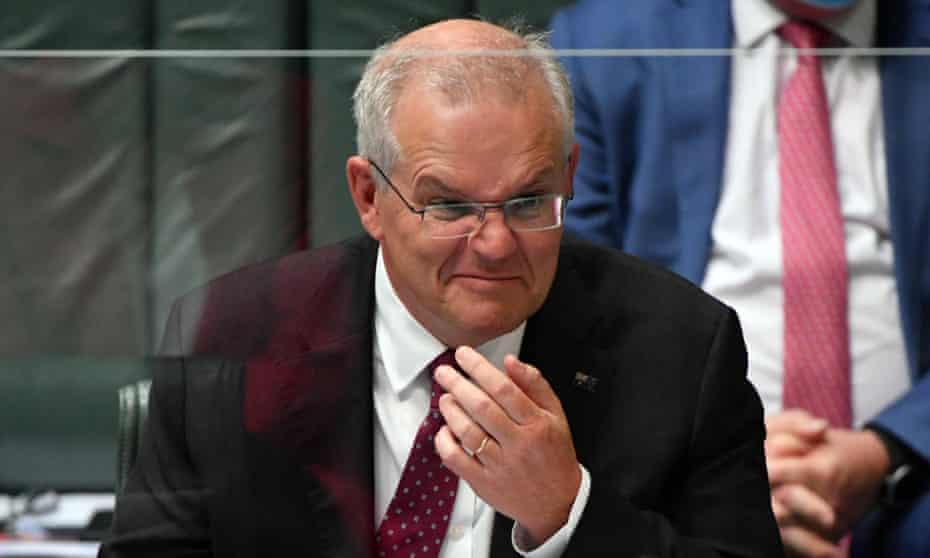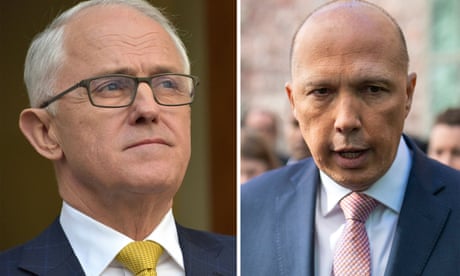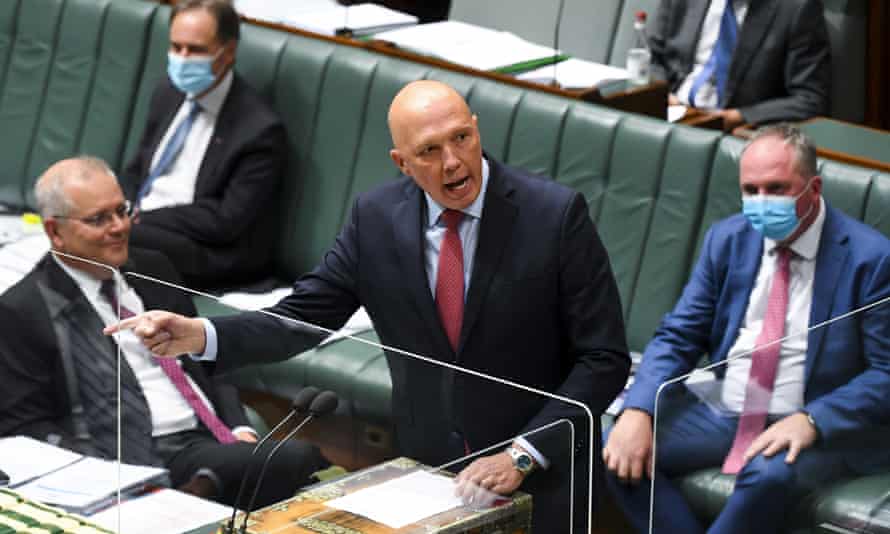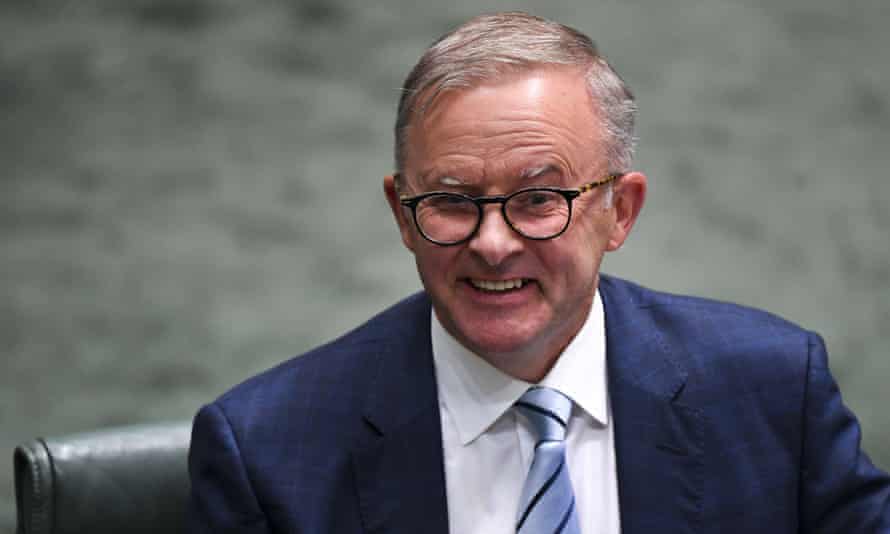The desperation on show during this past parliamentary week tells us we’ve entered the ‘whatever it takes’ zone of pre-campaign campaigning.

Prime minister Scott Morrison returned to the climate policy fray this week.
Unsurprising, then, that Scott Morrison – in between the rebellion of Liberal moderates on Thursday morning and a damaging cabinet leak in the afternoon – returned to the climate policy fray during question time. Hello darkness, my old friend.

Morrison was asked why he wouldn’t back Labor’s 43% medium-term emissions reduction target given that the assistant minister for emissions reduction, Tim Wilson, had said the former combatants were “more close than we’ve ever been before and all broadly swimming in the same direction”.
In response to this apparent provocation – the prospect of an end to a decade of bollocks – the prime minister extracted a dusty Abbott onesie from an invisible wardrobe and promptly zipped up. “Because Labor policies put up electricity prices,” Morrison declared. “Because Labor policies on emissions reduction close down manufacturing, close down the resources industry, take away people’s livelihoods.
“They adopt targets that they can’t achieve by simply pursuing technology targets, and they have to pursue it by putting up the cost of electricity on households and businesses and drive people out of jobs. That’s why we don’t adopt the Labor party’s policies.”
Hmm, yes, well. Couple of things.
Last time I checked, Australia’s resources giants remained global behemoths, which are actively planning a transition to a net zero international trading environment, and local manufacturing was still happening.
Morrison is now for and against climate action depending on which constituency he’s spamming
As for electricity costs, the Reputex modelling underpinning Labor’s policy suggests electricity prices will be lower as a consequence of a commitment to build more transmission infrastructure. That modelling says residential customers are estimated to save $50/Mwh by 2025 and $69/Mwh by 2030, with an annual electricity bill for an average household projected to be $275 lower by 2025 and $378 lower by 2030.
In any case, Abbott-onesie Morrison was completely transparent about who he was speaking to on Thursday. “So, if you’re living up there in the Hunter, if you’re living in La Trobe, if you’re up there in the Northern Territory or in the resources industry in Western Australia, if the Labor party seeks to form a government after this election, they’ll be doing it with the Greens, and they’ll be putting up your electricity prices, and they’ll be selling out the blue collar jobs of this country.”
Hopefully the voters of Goldstein, Wentworth, and North Sydney weren’t tuned in at that point because that would be awkward.
The point of me starting here this weekend isn’t to state the obvious. If you’ve been following politics, you’ll already know that Morrison is now for and against climate action depending on which constituency he’s spamming.
The point of the anecdote is to issue a general public service announcement. The desperation on show during this past parliamentary week tells us we’ve entered the “whatever it takes” zone of pre-campaign campaigning.
Folks, it is time to strap in, because when it comes weaponisation and outright lying, over the next few months, we are going to breach mach 3.
Morrison’s sole political objective at the moment, apart from avoiding being incinerated either accidentally or deliberately in an internal government bin fire, is to pivot out of the pandemic, which is no longer an automatic political winner for him, and into Big Daddy Will Keep You Safe From All The Scary Things – Scary (and Suspect) Labor Most Of All.

‘Before anyone could take the pantomime cue and boo or hiss, Dutton went full Manchurian candidate.’ Photograph: Lukas Coch/AAP
The defence minister said Labor wanted to pretend there was no difference between the two parties “when it comes to defending our nation in the next decade and the decade beyond” but that “nothing could be further from the truth”. Before anyone could take the pantomime cue and boo or hiss, Dutton went full Manchurian candidate. “We now see evidence that the Chinese Communist party has also made a decision about who they’re going to back in the next federal election … and that is open and obvious,” he said. “That’s open. That is obvious. And they have picked this bloke, the leader of the opposition, as their candidate.”
Right at that moment, I remembered a senior Liberal strategist telling me after a hyperbolic outburst from Dutton about asylum seekers and terrorism during the 2016 election (when the campaign theme was supposed to be there’s never been a more exciting time): “Look, Dutton is a dickhead, but he’s our dickhead.”
I’m not sure why that particular memory surfaced during question time on Thursday, but in any case I digress.
The times really are very serious, both domestically, and geopolitically.
Australia sits in a dangerous region where escalating militarisation narrows the scope for transactional pragmatism between neighbours with different values and political systems. Foreign interference is a serious problem imperilling democracies. All democratic institutions are vulnerable.
This is the reality we face.
In his threat assessment speech on Wednesday evening, the Asio boss, Mike Burgess, said the domestic spy agency had “recently detected and disrupted a foreign interference plot” in the run-up to “an election in Australia”. The risks are not hypothetical, or invented.
It’s also fair to say Beijing will take an interest in the outcome of the looming Australian election, and may initiate covert action with a view to furthering what it perceives as its interests.

‘Anthony Albanese, and Bill Shorten before him, are regarded well by Canberra’s security hawks.’ Photograph: Lukas Coch/AAP
But wondering about that doesn’t mean you’ve picked a candidate. Old fashioned, I know, but nuances are generally what separate verifiable facts from florid partisan invention.
Staying in the realm of facts as opposed to the exigencies of crude partisanship, Anthony Albanese, and Bill Shorten before him, are regarded well by Canberra’s security hawks. There’s a view that the two most recent Labor leaders have a more realistic appraisal of the threat an increasingly autocratic China poses to Australia’s sovereignty than Abbott had when he came to office nearly a decade ago (and by realistic, read hawkish). To be fair to Abbott, events have shifted significantly in the past decade, but you get the point. Albanese is regarded as professional and switched on.
Given the seriousness of the times, given there are higher stakes in play than the LNP’s primary vote in a few months time, it would be reassuring if Australia had a defence minister who could get a grip.
I suspect Dutton is too blunt an instrument to appreciate irony, but there is a fundamental irony about a defence minister hyperventilating about risk when that very same defence minister demonstrates a measurable appetite for partisan recklessness.
One last point. Obviously Dutton has a lot of rusted-on supporters in the Coalition. But when it comes to extended auditions for the top job – whenever there might be a vacancy – I’m confident some of the defence minister’s more measured Liberal colleagues also preferred the Dutton who thought he might smile more to the Dutton limbering up for full le Carré. If the Liberals are to hold on to the government benches, the party will actually need some votes south of the Tweed.
No comments:
Post a Comment